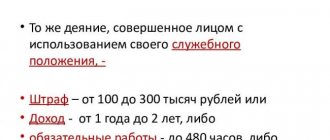Any unfinished crime constitutes an attempt. And if a person intends to cause serious harm to the health of another citizen or kill him, but in the end the victim remains alive, in this case the court will classify the criminal intent as an attempt. However, in this situation, difficulties often arise in establishing the causes and determining qualifications. It is not always possible to understand what the true motives of the culprit are, and whether he is going to fulfill his intentions, or is simply making threats. That is why it is necessary to know on what grounds the investigative authorities establish specific qualifications, and how they determine the criminal intentions of the culprit.
What is the sentence for attempted murder?
According to the general rule established in Art. 66 of the Criminal Code of the Russian Federation, the term assigned for an unfinished crime (attempt) cannot be more than 3/4 of the maximum amount of the most severe punishment for a crime of this type.
If we are talking about murder, then the most severe punishment for it is the death penalty. But, firstly, in the Russian Federation there is a moratorium on this type of punishment, and secondly, in paragraph 4 of Art. 66 of the Criminal Code of the Russian Federation there is a direct indication that the death penalty for attempted crime cannot be imposed.
The same applies to this type of punishment, such as life imprisonment: it is not assigned for attempted murder. Thus, the maximum penalty for attempted murder can be no more than 15 years in prison. This punishment is applied for committing murder under Part 2 of Art. 105 of the Criminal Code of the Russian Federation, i.e. in the presence of aggravating circumstances, such as:
- two or more victims;
- a victim who is in an obviously helpless state;
- there was a kidnapping with intent to murder;
- the victim is a pregnant woman;
- the crime was committed with particular cruelty (torture was used, the victim was mocked, etc.);
- victim - a person (or his relatives) performing official duties or public duty;
- an attempt to commit a crime in a generally dangerous manner (for example, through an explosion, arson, shooting in a public place, etc.);
- the motive for the murder is blood feud;
- the attempted crime was made by a group of persons (with or without prior conspiracy);
- the attempted crime was made for selfish or hooligan motives;
- the attempted crime was accompanied by extortion or robbery;
- the criminal acted on the instructions of the customer (hiring a killer);
- the purpose of the crime is to conceal another crime or mitigate its consequences;
- there was sexual violence;
- the motive of the crime is enmity and hatred towards one or another social group;
- the purpose of murder is to use the tissues and organs of the victim.
In the event of an attempt, maximum liability is established in accordance with Part 1 of Art. 105 of the Criminal Code of the Russian Federation and cannot be more than 11 years and 3 months.
Note! If the attempted murder was committed by a minor, then the responsibility for him will be less. The maximum penalty in this case is four and a half years for those under 16 years of age and seven and a half years for those who have reached their 16th birthday. In this case, the offender will not be sent to prison, but to a juvenile colony.
If a mother attempted to kill her newborn child, the sentence is set based on the provisions of Art. 106 of the Criminal Code of the Russian Federation and cannot exceed 3 years and 9 months.
It is worth considering separately murders that were committed in a state of passion. According to the provisions of Art. 107 of the Criminal Code of the Russian Federation, the maximum term for such a crime is three or five years (if there were 2 or more victims). This means that for an attempt to commit such a crime, the maximum punishment is 2 years 3 months and 3 years 9 months, respectively.
The statute of limitations for attempted murder is not reduced. It is equal to the statute of limitations established for murder, i.e. 15 years old.
What is attempted murder (Article 30 of the Criminal Code of the Russian Federation)?
Attempted crime is:
- intentional actions (or inaction);
- aimed directly at committing a crime (in our case, murder);
- in which the crime was never completed due to various circumstances beyond the control of the person (for example, the police arrived, relatives detained, and so on).
Please note that in an attempted murder, the reasons for not completing the crime DO NOT DEPEND on the subject . Those. the stop does not occur voluntarily (changed my mind, was afraid, regretted), but is influenced by objective factors:
- arrest by eyewitnesses;
- mistake in choosing a weapon;
- detention by police officers;
- providing the victim with timely medical care;
- the occurrence of circumstances and difficulties;
- missed shot;
- the victim's resistance was too active;
- error in the choice of poison and its dosage;
- the intervention of third parties prevented the offender from completing what he started;
- neutralizing an installed mine with a clock mechanism, and so on.
Judicial practice in murder cases was presented in the Resolution of the Plenum of the Supreme Court of the Russian Federation dated January 27, 1999 No. 1 “On judicial practice in murder cases (Article 105 of the Criminal Code of the Russian Federation)” (as amended and supplemented).
Paragraph 2 states that murder can be committed with both direct and indirect intent, but attempted murder can only be committed with direct intent.
This means that we have several mandatory signs on the subjective side:
- the culprit was 100% aware of the social danger of his actions or inaction;
- the perpetrator foresaw the possibility/inevitability of death;
- the perpetrator wished for death, but there was no fatal outcome due to circumstances that did not depend on the person.
If at least 1 of the signs on the subjective side is not proven (for example, the perpetrator did not want death or could not, due to circumstances, foresee its occurrence, or did not realize the public danger), then there is no direct intent.
There is no direct intent - there is no article for attempted murder under Art. 30 and art. 105 of the Criminal Code of the Russian Federation. Instead, other articles may be applied (for example, Article 109 of the Criminal Code of the Russian Federation “Causing death by negligence”).
But here there will be a delicate work of the lawyer, who must prove the absence of direct intent. Practice shows that this is quite difficult to do.
The crime of attempted murder
- Subjective side . The culprit was aware of the social danger of actions or inaction, foresaw the possibility/inevitability of the death of another person or desired death. Only direct intent!
- Subject . Criminal liability begins at the age of 14. If a person, due to the characteristics of his mental development, was not aware of the social danger, then he is not subject to criminal liability.
- An object . The perpetrator encroaches on public relations in the field of protection of personality, health and life.
- Objective side . Includes the act, the consequence, and the causal relationship between the act and the consequence. When analyzing the objective side, we see that it is incomplete:
- the act is;
- socially dangerous consequences in the form of the death of another person do not occur due to circumstances beyond the control of the criminal;
- there is a causal relationship.
When can there not be an assassination attempt?
In some situations, for crimes classified by law as murder, there cannot be an attempt, i.e. Article 30 of the Criminal Code of the Russian Federation does not apply to such compositions. This:
- causing death as a result of careless actions (Article 109 of the Criminal Code of the Russian Federation).
In this situation, there is no intent, which is the main qualifying feature for attempted murder;
- a murder that was committed due to excess of self-defense.
In such cases, there is no unfinished crime, which is also the main sign of an attempt. When qualifying a crime under Art. 108 of the Criminal Code of the Russian Federation requires proof that self-defense was necessary. If this is indeed the case, then the actions of the perpetrator of the crime cannot be regarded as attempted murder, since in self-defense it is impossible to plot something, the main goal is to repel the attack and save your life. If during the trial it is not proven that self-defense was required in this case, then the crime will be classified either as ordinary murder (for which an attempt is provided) or as infliction of bodily harm;
- an attempt to kill a law enforcement officer.
This crime is qualified under Art. 317 of the Criminal Code of the Russian Federation. Even if it was not completed due to circumstances beyond the control of the offender, liability will still occur in accordance with Art. 317 of the Criminal Code of the Russian Federation.
The difference between attempted murder and threat to murder. Why 11 years, and why 2 years?
Unfinished murder (attempt under Article 30 + Article 105 of the Criminal Code of the Russian Federation) and threat of murder (Article 119 of the Criminal Code of the Russian Federation) are issues that are difficult to distinguish between in practice and in theory.
And the point here is not in verbal threats: “I’ll kill you now!”, expressed without the intention of carrying out what was voiced. It is often difficult to distinguish between actions that indicate the seriousness of the violation (simulated strangulation, simulated stabbing, and so on).
At the same time, the punishments are completely different: if for an attempt you can get up to 11.25 years of imprisonment, then for a threat - 5 times less (up to 2 years of imprisonment under Part 1 of Article 119).
To make it easier for you to understand, we provide a comparison table. In it we will just point out how an assassination attempt differs from verbal: “Yes, I will kill you!”, voiced in a fit of anger:
| Criteria for delimiting compositions | Attempted murder | Death threat |
| Article of the Criminal Code of the Russian Federation | Art. 30 + art. 105 of the Criminal Code of the Russian Federation. | Art. 119 of the Criminal Code of the Russian Federation. |
| The purpose of the perpetrator's actions | Committing murder. All actions for this are carried out, but for objective reasons the culprit cannot complete what he started to the end (external factors influence). | Intimidation, exerting a frightening influence. Perhaps the culprit does not intend to carry out his threat at all. Perhaps he is going to do this, but with different actions. |
| Having will/desire | The murder is interrupted against the will of the perpetrator (for objective reasons). Above, we indicated what could interfere: medical help, insufficient dosage of poison, a missed bullet, a stop by law enforcement officers, and many others. | A person can implement a threat and take a number of specific actions, but voluntarily refuses. |
| Possibility of causing more serious harm to victims | Any harm to health can be caused (including serious harm). The main thing here is that the intentional infliction of death never took place. | Significant harm to health should not be caused. The maximum that the specified composition covers is mild harm. |
| Maximum sanctions and punishments provided for at the level of the Criminal Code of the Russian Federation. | If we have attempted murder, then the court can impose a maximum of 11.25 years (15 years * ¾) with a limit of up to 1.5 years (maximum 2 * ¾). | According to Part 1 of Art. 119 provide for several sanctions:
|
Judicial practice knows cases of so-called “unsuitable attempted murders” . The bottom line is that acts committed by a person cannot lead to socially dangerous consequences (roughly speaking, there is no cause-and-effect relationship).
There is no cause-and-effect relationship - there is no obligatory “attribute” of the crime. No composition - no article.
Typical examples of such actions are magical rituals, conspiracies, spells, whispering, visits to fortune tellers, the creation of damage, and the like.
The legislation does not provide for liability for murder in such cases, because the actions of the perpetrator are objectively incapable of causing the desired harm.
Criminal legislation does not change as often as civil law. But you should still keep track of changes and additions.
The article was written based on information current as of 2022. Do not violate the law (and if you have problems, contact experienced lawyers!).
Problems of differentiation from other compounds
In criminal law, there is a problem related to the delimitation of attempted murder from other crimes. Thus, it is not always easy to determine whether the perpetrator made an attempt on the life of his victim or simply threatened to kill. Punishment for such a criminal offense as threat of murder is provided for in Art. 119 of the Criminal Code of the Russian Federation, and it is much less than the punishment for attempted murder - two years versus eleven years and three months.
Difficulties arise due to the fact that death threats are often accompanied by specific actions, such as beating, strangulation, etc. In order to distinguish between these two elements of a crime, one should take into account the smallest details that indicate the presence or absence of intent to commit murder on the part of the perpetrator of the crime. But the prosecutor will try to prove the fact that intent was present, which means the punishment should be more severe.
A similar problem arises when distinguishing attempted murder from causing grievous bodily harm. The last crime is qualified under Art. 111 of the Criminal Code of the Russian Federation, it carries a lighter penalty - imprisonment for up to 8 years. In such cases, the cornerstone is the presence or absence of intent to kill the victim. If the lawyer manages to prove that there was no such intent, then the crime will be classified under Art. 111 of the Criminal Code of the Russian Federation, which means a reduction in the sentence for the guilty person.
The correct qualification of the actions of the accused in the event of harm to the health of the victim is key in the analysis of cases in which Art. 30 of the Criminal Code of the Russian Federation on attempted murder. And this is precisely where the court often has difficulties. In the absence of a good defense, there is a high chance that the judges will side with the prosecutor and impose a maximum sentence. Therefore, if you or someone close to you has received the status of an accused of attempted murder, do not hesitate, but contact our experienced lawyers. During the trial in your case, they will present all the necessary evidence that will help the court classify the crime correctly and in accordance with the necessary articles of the Criminal Code of the Russian Federation. Contact us also in the case when an attempt was made on your life and you want to punish the criminal. We will definitely help you present to the court evidence that there was intent to kill. Call or leave your request on our website.
Special cases of liability
It is generally accepted that an attempt on life is initially an unfinished crime, however, there are precedents when an attempted murder will be equated to a completed criminal intent. Some norms of the Criminal Code of the Russian Federation (277.295 and 317) introduce such a concept as an attempt on life, and both unfinished attempts and completed actions may fall under its effect.
In this situation, responsibility for the attempt on a certain circle of persons is established, and the attempted murder is associated primarily with the activities of the person (employees of the judiciary and prosecutor's office, bailiffs and law enforcement officers). If such a situation occurs, then the attempt will be classified under the relevant article of the Criminal Code of the Russian Federation, but will not refer to the provisions of Part 3 of Article 30 of the Criminal Code of the Russian Federation.
In general, experts note that recognizing the attempt as a completed crime will have certain goals:
- Designation of an increased level of public danger when an attempted murder is committed against officials and high-ranking officials, as well as employees of the judicial and law enforcement systems.
- The possibility of establishing the maximum possible punishment, which is provided for by the actual legal framework. This is necessary because the general rules regarding the act establish punishment within ¾ of the most severe penalty. It is also worth mentioning that the statute of limitations does not change in any way here, and is 15 years.
Key features and measure of responsibility
In order for an attempt to be qualified as an attempt, two signs must be present:
- The person’s intent has been established, that is, he is aware of the result of his intentions and understands that criminal liability will be determined against him;
- There is a causal connection between the attempt by the perpetrator and the result, which, however, for reasons beyond the control of the perpetrator was not finally realized.
- The intention was not fully realized, that is, the ultimate goal - murder, was not carried out.
Speaking about the specific term of punishment, it should be noted that it can be set in the range from 6 to 15 years, and primarily depends on the specific results of criminal intent. For example, if the court determines the presence of aggravating factors, the offender may be sent to prison for a maximum term of 15 years.
If physical harm to the victim’s health occurs, then Art. 111 of the Criminal Code of the Russian Federation, which separately indicates that a citizen can have their liability reduced by a third of the maximum limit (15 years). In such a situation, the punishment will be determined for a period of 2 to 8 years.
Author of the article
Dmitry Leonov
Work experience 15 years, specialization - housing, family, inheritance, land, criminal cases.
Author's rating
721
Articles written
712
about the author








